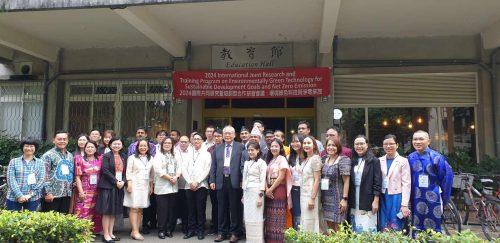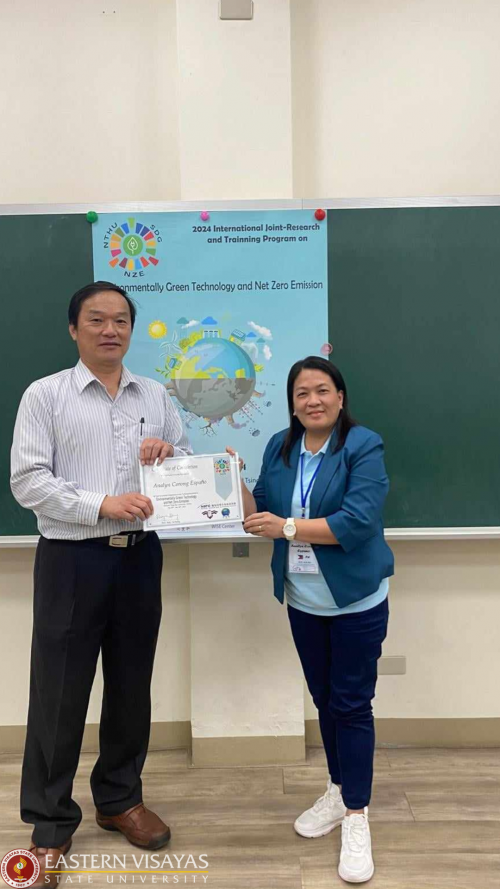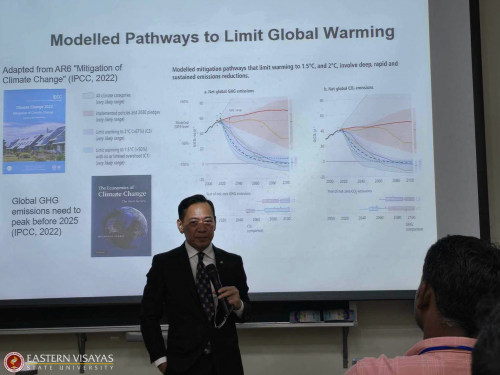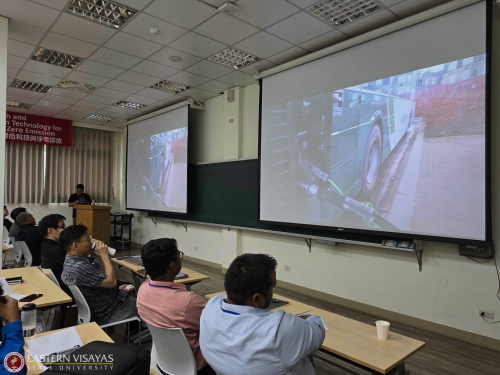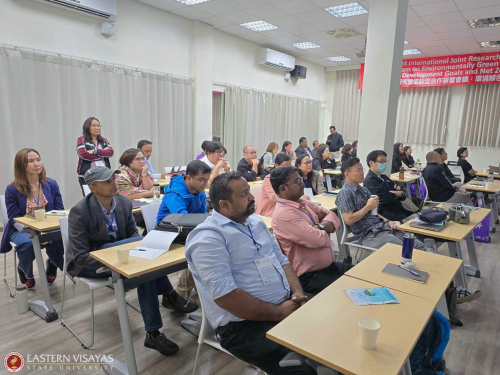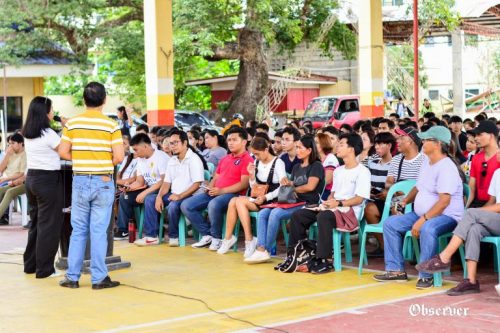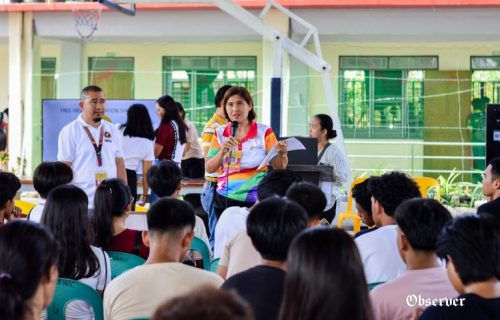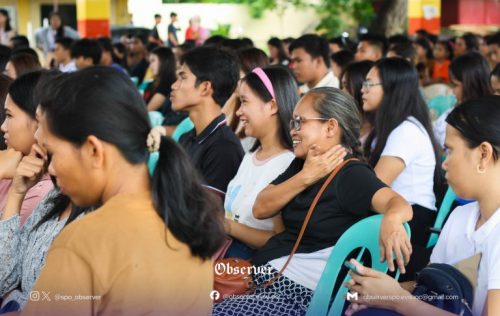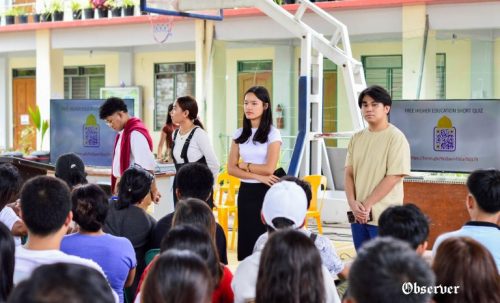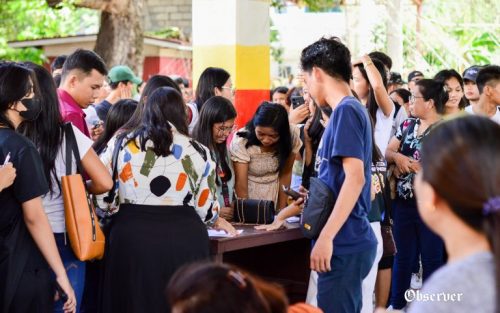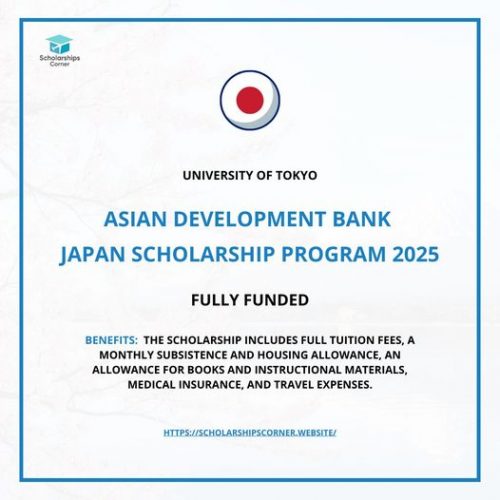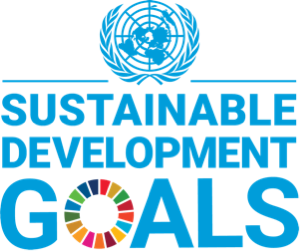In 2024, Eastern Visayas State University (EVSU) reaffirmed its enduring commitment to advancing Education for Sustainable Development (ESD) through strategic partnerships, curriculum innovation, and inclusive learning opportunities. Guided by its vision of producing globally competent graduates who are responsive to the needs of society, the university’s initiatives during this period reflected its strong alignment with SDG 17: Partnerships for the Goals and SDG 4: Quality Education—anchored on collaboration, equity, and transformative learning.
By linking local relevance with global engagement, EVSU continued to serve as a regional center of sustainability learning, connecting education, research, and community engagement in support of the United Nations 2030 Agenda for Sustainable Development.
One of the major highlights of 2024 was EVSU’s participation in the 10-day International Course on Sustainable Green Technologies for the SDGs held at National Tsing Hua University, Taiwan, from October 29 to November 9, 2024. Represented by Dr. Analyn C. Españo, Vice President for Research, Development, and Extension Services, EVSU was among 31 select institutions worldwide chosen from more than 500 applicants. The program provided participants with in-depth exposure to sustainable green technologies, environmental innovation, and strategic partnerships for the SDGs. EVSU’s inclusion in this international course underscored its growing reputation as an institution committed to integrating sustainability principles into academic and operational frameworks.
Upon return, the university cascaded the lessons and innovative practices learned in Taiwan through internal capacity-building workshops, research collaborations, and policy dialogues that enriched the institution’s sustainability roadmap. These engagements not only strengthened global-to-local linkages but also empowered EVSU to translate international best practices into context-specific solutions addressing regional environmental and social challenges.
Through sustained collaboration with local government units (LGUs), national agencies such as CHED and DOST, and regional industries, EVSU continues to facilitate knowledge transfer, technology adaptation, and joint projects aligned with the SDGs. These efforts collectively position the university as a cooperative hub of sustainability education and innovation in Eastern Visayas.
EVSU upholds the principle that sustainability education must be inclusive, interdisciplinary, and experiential. The university integrates SDG concepts across various courses and programs—ensuring that students, regardless of discipline, develop both the cognitive understanding and ethical orientation necessary to advance sustainable development. Sustainability and community resilience are deeply embedded in general education and institutional subjects such as the National Service Training Program (NSTP) and Disaster Risk Reduction (DRR). These courses engage students in community immersion, environmental conservation activities, and disaster preparedness projects, fostering awareness of social responsibility and environmental stewardship.
Beyond these, academic programs in Engineering, Architecture, Agriculture, Environmental Science, Nutrition and Dietetics, and Fisheries integrate sustainability principles into their core curricula. Students learn to design and implement solutions that balance innovation with ecological integrity, social inclusion, and ethical responsibility—essential elements of Education for the SDGs (ESDGs). This comprehensive approach ensures that all EVSU students engage meaningfully with sustainability themes, transforming the university’s educational framework into a model of applied, outcomes-based learning for sustainable development.
EVSU’s sustainability framework also rests on the foundation of inclusive and equitable access to education. Through the Free Higher Education Program implemented across all campuses, the university guarantees that students from diverse socioeconomic backgrounds can pursue higher learning without financial barriers. This program is particularly impactful in the College of Education, where Bachelor of Elementary Education (BEEd) and Bachelor of Secondary Education (BSEd) students are equipped to become future educators who integrate sustainability concepts into classroom teaching. These teacher-education programs emphasize curriculum development, pedagogical innovation, and community-based learning anchored on SDG values such as equality, resilience, and global citizenship. By empowering future teachers, EVSU extends the reach of sustainability education beyond its campuses—embedding it within the basic education system and ensuring that younger generations inherit the skills, values, and perspectives needed to contribute to a sustainable future.
Complementing its inclusive education mandate, EVSU also provides a wide range of optional and specialized opportunities for students and faculty to deepen their engagement with sustainability-focused fields. Through international scholarships, advanced training, and merit-based programs, the university builds human capital capable of driving innovation and transformation. Programs such as the University of Tokyo ADB–Japan Scholarship Program (2025) and the Comprehensive Insights into Open RAN Advanced Courses open doors for EVSU scholars to access world-class education in sustainable technology, communication systems, and green innovation. These initiatives expose participants to cutting-edge practices in research, digital transformation, and sustainable infrastructure, which they later apply in their academic and professional contexts.
By promoting international exposure and multidisciplinary collaboration, EVSU strengthens its academic community’s capacity to lead sustainability transitions at both local and regional levels—bridging global expertise with grassroots impact. Through these sustained and interconnected initiatives, EVSU has institutionalized a holistic framework for Education for the Sustainable Development Goals (ESDGs)—anchored on access, partnership, and transformation. By integrating sustainability principles across its curriculum, engaging in international collaboration, and empowering students from all backgrounds, EVSU demonstrates how higher education can serve as a catalyst for societal resilience and environmental responsibility.
In alignment with the 2030 Agenda for Sustainable Development, Eastern Visayas State University remains steadfast in its mission to equip learners with the knowledge, ethics, and innovation mindset necessary to build a sustainable and inclusive future—locally, nationally, and globally.




